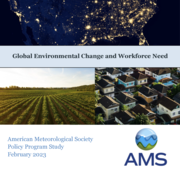Executive Summary
Global environmental change is increasingly at the forefront of national and international concern. As society seeks to understand and address the challenges related to global environmental change, the weather, water, and climate (WWC) enterprise will be an essential partner. This endeavor will influence the application of science, including the “translation” of science for various audiences and situations. Consequently, it will almost certainly require an expansion in the skills, personnel, knowledge, and training of the workforce. However, as the scope of global environmental change is broad and encompasses many sectors of society, the emerging needs within the workforce are accordingly complex and diverse.
This American Meteorological Society (AMS) Policy Program study is the third of a series of workshop-based studies to help provide the foundational understanding that the WWC enterprise needs to meet future workforce challenges in Earth system observations and science. We first focus on the developing “climate workforce” as a key component of society’s response to global environmental change. While climate change is only one aspect of global environmental change, the application of climate knowledge is increasingly relevant throughout a large portion of the workforce in a variety of ways. As such, the term “climate workforce” is used broadly here to refer to numerous job positions that lie along a spectrum of familiarity with climate science.
Through conversations with professionals representing two fields that are likely to have an increasing need for climate observations, science, and translators—agriculture and urban planning—we identify seven key findings on the ways in which global environmental change is driving the workforce and how the enterprise as a whole might respond to these developments in order to most effectively advance WWC observations and science and benefit society.
Findings:
- While climate change is only one aspect of global environmental change, the application of climate knowledge is increasingly relevant throughout a large portion of the workforce in a variety of ways and so represents a key component of society’s response to global environmental change.
- The climate workforce encompasses a wide range of roles and responsibilities; however, those involving a component of translating science for various audiences are likely the fastest-growing set of positions and would benefit the most from additional support from the broader WWC enterprise.
- Climate translation has the greatest impact when it is a multilateral and iterative process focusing on relevant impacts and solutions for a particular stakeholder group rather than explaining the science behind a certain projection. Serious consideration of environmental justice and meaningful community engagement is a necessity when obtaining, disseminating, and otherwise translating climate information.
- Organizations and individuals within the climate workforce will need to balance expertise in a few fields with strategic collaborations to fill gaps and maximize impact.
- There is a strong need to integrate datasets and methodologies, including those from a wide range of social sciences. Data management skills will therefore be essential, as will incentives to support interdisciplinary and transdisciplinary work.
- As the workforce expands, it is as crucial to establish mechanisms to support retention and resilience within the workforce as it is to promote specific skill sets.
- There are opportunities for training and collaboration within the workforce, such as a climate certification program, that may help ensure standards for climate knowledge and enhance the value of WWC observations and science.
Following the outcomes of the workshop discussions, we present a definition of the climate workforce that reflects how different groups may utilize or relate to climate knowledge. Positions may be termed as “knowledge-forward,” “knowledge-extending,” “knowledge-drawing,” or “knowledge-embedded.” However, these groupings should not be taken as concrete or hierarchical and may perhaps best be seen as a shorthand for the ways in which positions with different levels of climate knowledge all contribute to the larger and ever-evolving ecosystem of the workforce.
Continuing to examine and refine the roles of and interactions among the academic, public, and private sectors is crucial for identifying emerging workforce needs and options for addressing them across all sectors of the enterprise. Through its studies and related activities, AMS will continue to build and enhance frameworks for workforce success based on three foundational components: 1) expanding interest in weather, water, and climate issues broadly throughout the public, 2) empowering broader contributions from professions within and outside of the enterprise, and 3) helping to ensure that people have the skills needed to make the contributions they can and wish to make.
Suggested Citation: Tipton, E. 2023: Global Environmental Change and Workforce Need. An AMS Policy Program Study. The American Meteorological Society, Washington, D.C. https://doi.org/10.1175/global-env-change-workforce-2023
